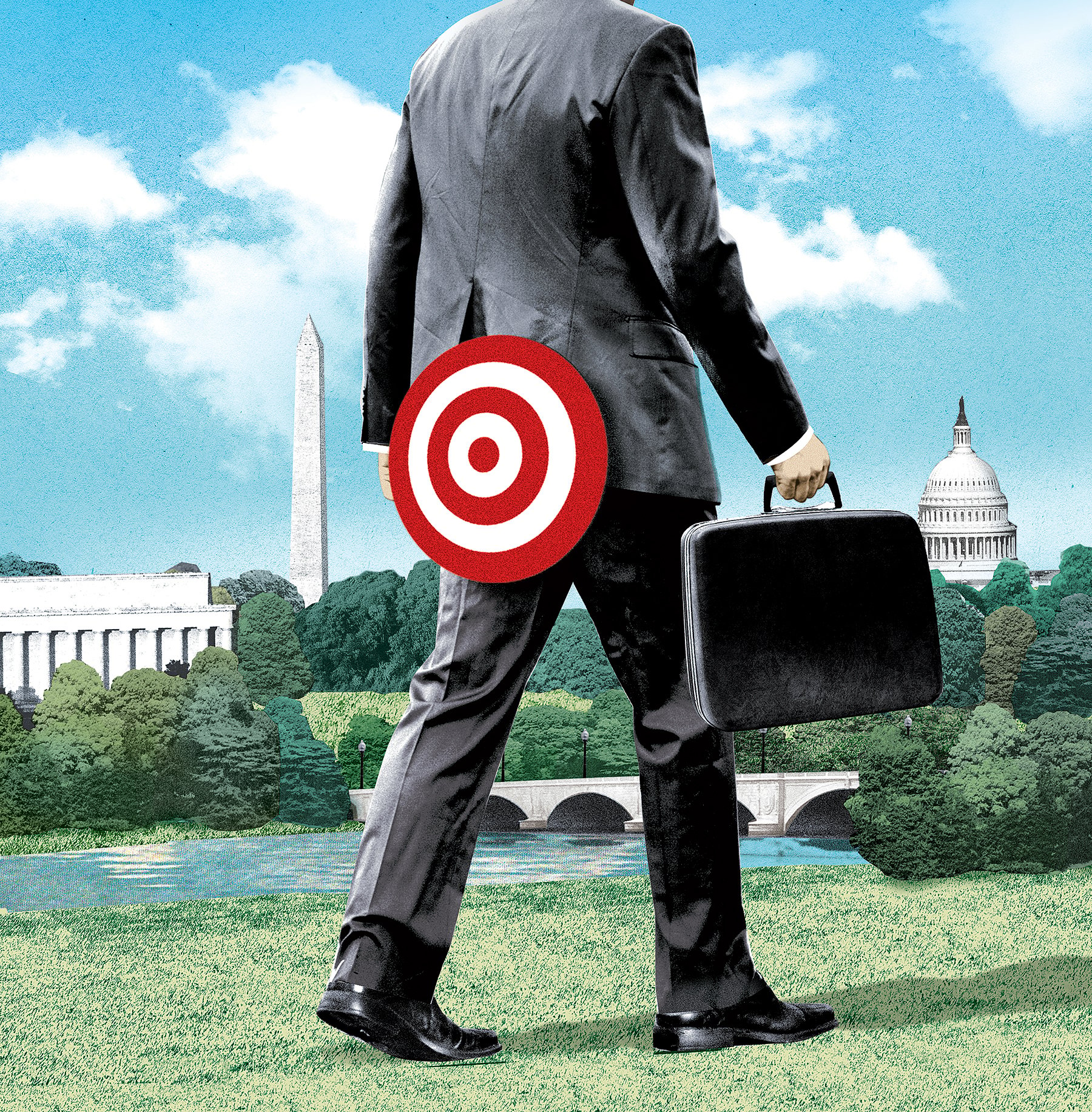“Sucking up,” Mark Leibovich wrote in his 2013 book, This Town, “is as basic to Washington as humidity.” This seems especially true in 2017, when the President’s yen for flattery has turned the practice into a hallmark of his administration. Though sycophancy obviously knows no political party, the current regime tends decidedly toward the adulatory. As the Washington Post put it recently, “One defining feature of managing Trump is frequent praise, which can leave his team in what seems to be a state of perpetual compliments.”
That makes it a great time to release a book on the subject. Sucking Up: A Brief Consideration of Sycophancy is a slim but insightful look at the phenomenon, written by married academics Deborah and Mark Parker, a University of Virginia Italian professor and James Madison University English professor, respectively.
The Parkers started working on the book three years ago, so their interest predates this moment of public self-debasement. The idea was actually born in the Parkers’ own workplace, when each was chairing a department. “We noticed an uptick in the amount of sucking up in the academic environment,” Deborah says. “We were talking to friends, trading stories—a lot of kvetching about the topic—and we decided that rather than complain, we’d try writing about it.”
The book explores sycophancy from a variety of angles, moving fluidly from social science to politics to classic literature. Dante and Jane Austen, it turns out, offer as many lessons as virtuoso flatterer Henry Kissinger (who, the authors note, was some-times referred to as “Henry Ass-Kissinger” by his Harvard classmates).
The reason for tongue-bathery’s recent ascent, the Parkers say, is not just the ego needs of our President but also a fundamental realignment of suck-up culture’s delivery system. Basically, it’s Twitter’s fault. “With new media, it’s more of a spectacle,” Mark says. “It’s not people sucking up behind closed doors. There used to be more subtlety to it. Now it’s more shameless. It’s something by which you’re judged.”
I recently moved back to Washington after many years away, and I have to admit I find myself struggling to readjust to some of the city’s tribal customs. Among other things, I’m pretty bad at ass-kissing. Maybe you’re thinking that’s a good thing—after all, nobody likes a brown-noser. But if I truly want to acclimate to what Leibovich not-so-fondly calls Suck-Up City, I should, for the sake of open-mindedness and anthropological exploration, at least give it a shot.
I decide to ask the Parkers for advice. I should note here that Sucking Up is not intended as a manual—the authors are firmly in the anti camp. Nonetheless, in the spirit of friendliness, academic inquiry, and—another long-cherished DC tradition—book promotion, they were willing to help.
The first thing, they tell me, is to remember that people want to be flattered, which makes elementary suck-up behavior pretty easy to pull off. Basically, the idea is to identify people you want something from, then say nice things to them that you don’t mean. But high-caliber sycophancy requires a lighter touch. Agreeing with your boss is an essential workplace skill, for example, but a true master knows how to be more strategic. “You can disagree on things that don’t matter, but then go to full sucking up on the things that will really get you something that you want,” Mark Parker says. “You can also disagree at first and then come to the person’s opinion, which makes them feel like they’re not only right but also persuasive.”
It’s important to read your target accurately. (“It helps if your boss is a bit on the dim side,” Deborah says.) And being overly agreeable can backfire, making you seem too spineless for promotion to a leadership role. Mostly, though, sucking up is popular for a simple reason. “The biggest takeaway from the research,” Mark says, “is that it works. It’s sad, but it works.”
The Parkers take it as a given that sucking up is bad, but I’m not so sure. Isn’t a bit of oiliness just the grease that helps run Washington’s ego-fueled machinery? What, ultimately, is so bad about it?
The biggest danger, it seems, is that you’ll succeed. “People think of it as a kind of transaction, but I think it’s worth going back to the traditional associations of sycophancy with excrement and slime,” Mark says. “It does change you. A campaign of this will make you a different person.” Duly warned (and a bit nauseated), I decide to push ahead. It’s time to put my new knowledge to work in the wilds of real-world DC.
So, purely in the interest of science, I call up an expert chronicler: Mark Leibovich himself. We chat for a while about the finer points of local sycophancy. “It’s not like in Washington we make products like steel or cars or beer,” he says. “It’s often how well you can network, win favor, build your brand, and so forth. So, yeah, if you’re good at sucking up, you can really make it work for you. We all know the type. There’s a whole collection of people in Washington who have built careers on just that.”
As our conversation winds down, I decide to hit him with my best attempt at a bootlick. “Before you go,” I say, trying to sound casual, “I should mention that I thought This Town was brilliant and hilarious and insightful, and it changed the way I think about how Washington works.” Inconveniently, this all happens to be true, rendering my effort invalid from the start (insincerity being one of sycophancy’s nonnegotiable attributes). But given Leibovich’s deep knowledge of the ways of Washington ego maintenance, I decide to ignore that technicality and push on.
So how did I do? “You should have led with that!” he responds. “The first rule of sucking up is to flatter at the top of the conversation, not the end. You’d have put me at ease, and I would’ve told you some real shit.”
In other words, I blew it. Despite all of the Parkers’ efforts, I remain at best a remedial butt-kisser. But Leibovich is gracious about it, and as he signs off, I start to think that maybe things didn’t go as terribly as I suspected.
“Good luck with the story,” he tells me. “Thanks for the nice words.”
This article appears in the December 2017 issue of Washingtonian.



















